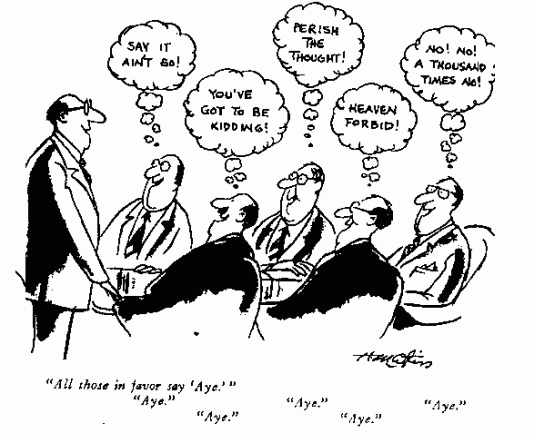Groupthink
Theory Development:
Groupthink was originally developed by Irving Janis in 1971 in his article Groupthink published in Psychology Today. In 1972, Janis had published a book called Victims of Groupthink in which he further explained his theory of groupthink.
Theory:
Groupthink is the “psychological terminology used to describe the mode of thinking that persons engage in when concurrence-seeking becomes so dominant in a cohesive ingroup that it tends to override realistic appraisal of alternative courses of action” (Janis, 1971). It occurs when the primary focus of members in a group is to appease their group and avoid conflict. When this happens, the main focus of the group is forgotten. “ In groupthink, members faced with making a decision focus so much on getting along, being seen as a ‘good’ group member, and agreeing that they may not adequately evaluate the option they are considering” (Stolley, 2005).
Irving Janis developed eight symptoms for why groupthink may occur.
Pressure- Members in a group may put direct pressure on individuals for questioning or doubting any ideas the group may have.
Self-Censorship- When individuals feel the group has a consensus over a topic, they choose to remain silent about their thoughts and begin to doubt themselves.
Unanimity-Participants in a group may feel there is a unanimous opinion because it boosts their self-confidence.
Invulnerability- This provides members of a group some assurance to believe they cannot fail in their tasks, so they take extraordinary risks in their decisions.
Rationale- Often, groups lead people to believe that they can do nothing wrong, so the members ignore any negative feedback and beliefs that something can go or become wrong.
Morality- many times victims of groupthink want to fit in with the group so much that they ignore any ethical or moral consequences.
Stereotypes- Groups often feel that “rival” groups are not a productive as their own group. This can cause low and negative productivity for each group
Mindguards- there may be members of a group who hold back certain information from the group leaders so that information does not have any negative effects on the decisions of the group.

Although all the men are thinking one thing, they each are agreeing with the rest of the group by saying "aye."
